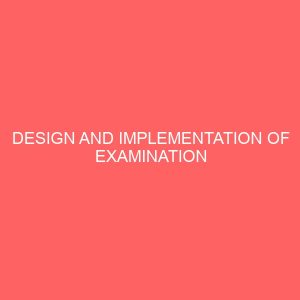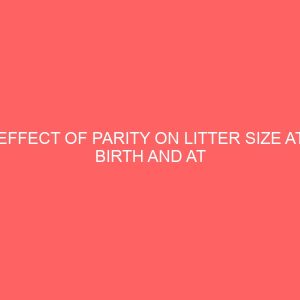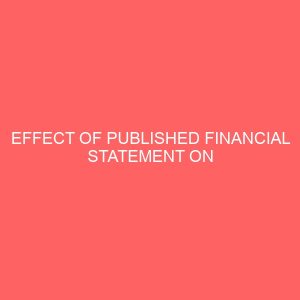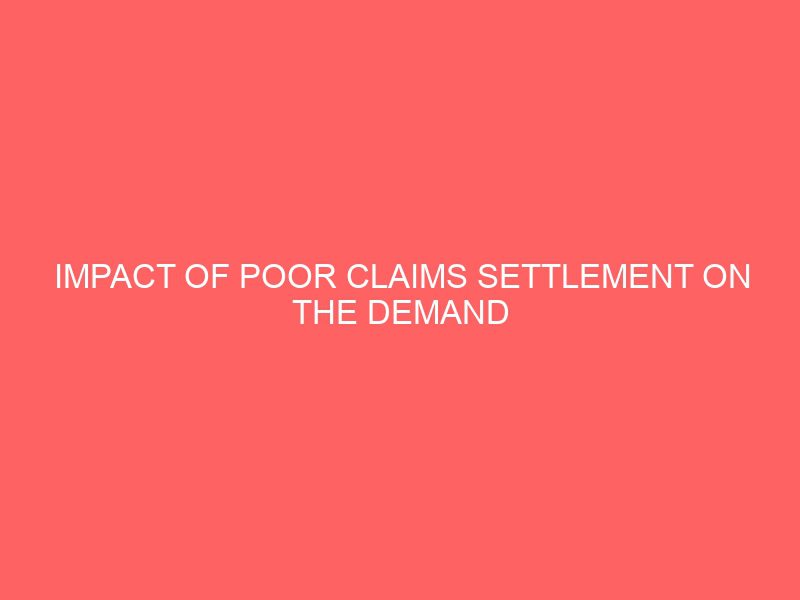Description
CHAPTER ONE
INTRODUCTION
1.1 Background of the Study
Insurance is usually an intangible product for clients until they receive a payment for an insured loss. The claims experience can therefore significantly influence the client’s understanding of and satisfaction with insurance. A positive claims experience may result in a long-term client and champion of the insurance programme. A negative experience, on the other hand, can lead to mistrust and policy termination. Claims settlement is therefore an integral part of an insurer’s efforts to provide good customer service and to retain clients (Rendek, Holtz and Fonseca, 2014).
The history of insurance industry in Nigeria could be traced to the British colonial trading companies that established agency offices in Nigeria, on behalf of insurance companies in UK. After the Nigerian political independence of 1960, indigenously owned insurance companies sprang up, which as a result of inadequacy of capital, were unable to pay claims at as when due. This inadequacy of capital coupled with lack of technical and managerial skill, poor insurance regulatory framework, brought confidence crisis and strong apathy to insurance purchase in Nigeria (Augustine and Bamidele, 2013).
The rising intricacy of the world economic system in today’s industrial age has increased the importance of insurance in the process of manufacturing and profit-making dealings. Accordingly the absence of insurance will constantly subject the individual/organization to the fear of a huge financial loss in the event of a tragedy and so will affect their decision making course of action in diverse ways (Harry, 2012).
Claim settlement is a critical aspect of the insurance business. Insurance on its right is an investment options for common investor. The insured expects specific return from the policy over and above the sum assured. Therefore, the insured or the beneficiary named in the insurance policy desperately seeks settlement of their claims by the insurance company. The insurance company looks at the claim settlement from the different perspective by ensuring adequate return from the risk assumed. Thus, poor claim settlement may lead to confrontation between the policyholder and the insurance company (Ashturkar, 2014).
Claim settlement is the defining moment in the relationship between an insurance company and its customer. Butler and Francis (2010) see claim payment as a chance to show that the years spent paying premiums were worth the expense. Hence, insurers have been criticized for their marketing methods, based on cloudiness, twisting and mis-selling. If a company does not effectively handle its claims service, it can tarnish its image hence affect the sales and marketing of their insurance products. Insurance company’s attitude to claims settlement has in the past provoked a lot of public criticism and even attracted the attention of governments.
Consequently, the reputation of any insurance company and consumers demand for insurance depends, to a large extent, on the sort of claims services provided by the company to its customers. Insurance companies in Nigeria now wish to improve their public image, and retain the trust of their brokers (middlemen) and clients in order to meet their sales and marketing department projections. Swift handling of claims is surely the way to do it. This study examines the impact of poor claims settlement on the demand for insurance with a special reference being made to Cornerstone Insurance Plc.
1.2 Statement of the Problem
In Nigeria, the insurance companies, just like other insurance companies in other parts of the world, do pay claims, yet they have a dented image in the eyes of the insuring public (Omar, 2007). The problem of running an effective claims administration that would satisfy the customers and earn their confidence as well as cause them to repurchase insurance products has remained too long in the insurance industry in the sub-region and the world at large.
Claims settlement is like a mirror through which the members of the public see an insurance company. A company, which fails to settle claims to the satisfaction of customers, would definitely attract less business, as it is likely to discourage such clients to continue to insure with the company. Such clients might even advise their friends, colleagues and relations not to patronize such a company.
The consequent effects of the above problem could lead to downward trends in sales and marketing figure, low premium income, low capital formation (savings and loans) and minimal contribution of an insurance company to the gross domestic product (GDP) of Nigeria.
An insurance company is basically set up like other profit-oriented industry for financial gains while rendering essential services to their clients. But in recent times poor handling of claims has been a major drawback to performance of insurance companies. The menace has been so prevalent that many policyholders in Nigeria often contemplate terminating their policies in the face of the insurance companies not indemnifying them on account of losses suffered. Omar (2007) identifies lack of trust and confidence in insurance institution, poor claims management, lack of reliable actuarial data for research and underdeveloped financial market as some of the bottlenecks to the financial performance of the insurance industry in Nigeria. Therefore, this study examines the impact of poor claims settlement on the demand for insurance in Nigeria.
1.3 Objectives of the Study
The study is being conducted with the following objectives:
I. To investigate the effect of poor claims settlement on the demand for insurance.
II. To explore the link between effective claims settlement and insurance companies’ performance in Nigeria.
III. To examine the impact of poor claims management on public perception of insurance business in Nigeria.
1.4 Research Questions
The study will be guided by the following research questions:
1.What is the impact of poor claims settlement on the demand for insurance?
2.Is effective claims settlement a significant predictor of insurance companies performance in Nigeria?
3.Does poor claims management impact on public perception of insurance business in Nigeria?
1.5 Research Hypotheses
The under listed hypotheses will be statistically tested in the course of this study.
1) Ho: There is no significant relationship between poor claims settlement and demand for insurance.
Hi: There is a significant relationship between poor claims settlement and demand for insurance.
2) Ho: Effective claims settlement is not a significant predictor of insurance companies’ performance in Nigeria.
Hi: Effective claims settlement is a significant predictor of insurance companies’ performance in Nigeria.








Reviews
There are no reviews yet.